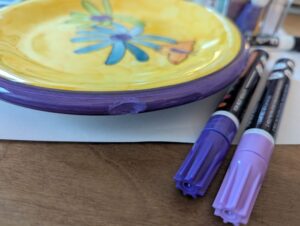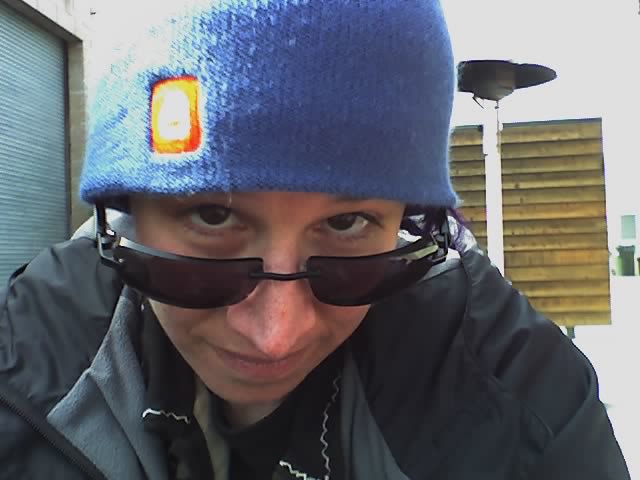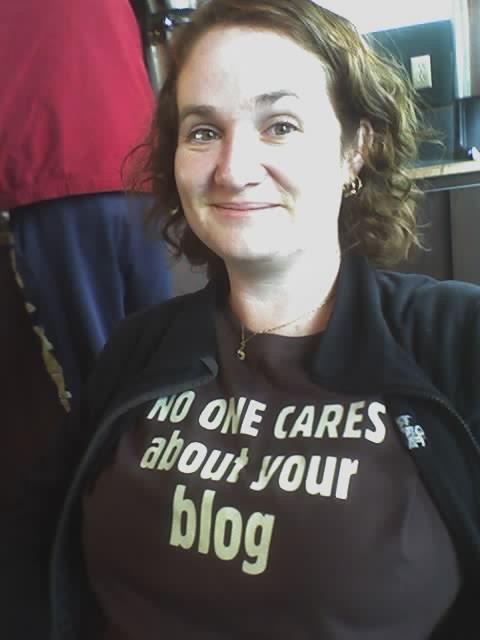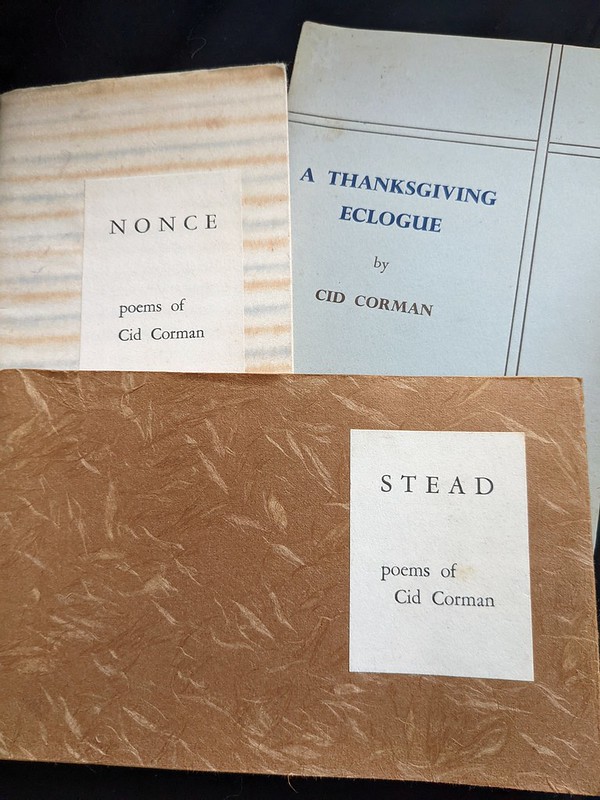My sister and I went to see Kathleen Hanna talk about her autobiography, Rebel Girl, last week. I recommend it! She was interviewed by poet, musician, and zinester Brontez Purnell and that was a joy because they had such lovely friendly chemistry and were able to laugh and enjoy themselves.
What a story – that Brontez was one of, as he describes it, “the 5 total riot boyzz in the world” who were writing letters to Bikini Kill and getting answers back from Kathleen. She described his 1993-ish letter, accompanied by a selfie he took of himself on the school bus, and how she had it taped up over her desk for the next 10 years. Write to your heroes everyone! They may like it! Then years later his band was opening for her band and now they are friends! A fairy tale that I love so much. I will likely review his recent book Ten Bridges I Have Burnt in a different post, since I bought it at the talk but have not read it yet.
It shouldn’t have been surprising to find Kathleen is tremendously funny. I had this reaction seeing her age up into a mid 50s person who is happy and has a secure life who deals with the intense trauma of their past with wry humor and is hard as nails but also soft as fuck and able to let it hang out and tell her stories and have a different kind of creative freedom where you get to explore your art while also — shocker — impossible — being supported. Maybe it sounds a little arrogant but that is how I feel about my life trajectory and it was so good and moving to know she is in a good place with her bands and singing and writing and her Beastie Boys husband and their loved and cherished child.
I did not know but also probably should have if I thought for 5 seconds that she has some also similar experiences being a person who other people report their trauma TO. By talking about rape and harassment you become kind of a magnet, you have freed others to talk about their traumatizing experiences and they want to tell you about it. Like the boxes of riot grrrl zine mail I was getting (and still have in the basement unsorted, unarchived) while still super fucked up in my early 20s from girls just a bit younger than me – it can be hard to take and she had to do that in person while having that level of indy fame where people make a lot of assumptions but you are desperately trying to scrape $40 together for medical care and eating dry ramen noodles and working at a strip club while you are ill as hell. My point was that when you talk about fighting rape & harassment you become the respository of everyone’s worst and hardest stories, and that is a hard load to carry no matter how much you feel honored and are willing to do the work of it. I vibed with all of this.
Of course I could talk about riot grrrl shit for fucking ever but that can wait.
Loved her joy in figuring out recording and mixing stuff (much of that, later on, in Julie Ruin era).
Loved the Kathy Acker stories both about being told no one listens to poets – better to be in a band — and about being smacked with a challenge to feminist essentialism (which I don’t 100% agree with actually, but it sounds like it was good for Hanna to be taken seriously & challenged by Acker.)
You can think, well what if Kathleen Hanna and so many more of us could have made our art without all this abuse and trauma and constant harassment? What if we could have support and love from family and have friends who don’t rape us and people who support our artistic careers without grossly hitting on us every fucking 5 seconds ? WHAT IF. But you cannot eat your heart out over it. & just hope for the youth to be MORE OK or at least to have that love and support and freedom.
Instead of eating my heart out I just feel tremendous respect for all the punk rock women making their music and expressing their feminism against all the things that made it difficult – poverty – racism – family – gross men – addiction & alcohol’s pull – hostile media – And so on. They did it and they survived (or didn’t) and it gives me immense strength just to think of them.
(I still miss you, Johanna Lee.)
I’m also 100% ok with her telling her own story about herself. This isn’t a collective story written by everyone who was involved and it isn’t trying to encompass everything that happened. It’s quite hard to make a coherent narrative out of a life, even one’s own life! I also liked the style of the short vignettes (which I have also been trying out.)
I hope it is immensely (further) healing for Kathleen to talk about her book and her life on stage in venues where she is respected and listened to and celebrated as an artist and for her whole self.
I enjoyed her stories and the book. She left out countless assaults and rapes I’m sure (which she joked about on stage) And I read with some sadness but also interest, about “Susan” who I instantly knew who it was, and I’d link but, What the actual Fuck, apparently there is still shit you can’t talk about? Of course it is fraught but it was interesting to see Hanna frame that interaction as encountering someone who she could not deal with because of their intensity and over-familiarity and having repeated mental health meltdowns on the bedroom floor of someone who didn’t actually want to let you into their house. However I was kinda sad to see her throw shade on “Susan”‘s writing and zine output, which I thought at the time was great and still love for its raw energy and realness because it spoke to me. I always appreciated “Susan’s” zines, mail, and mutual distro activity. At the time I did not know about the ridiculous and horrible problematicness of their behavior and their claims. The information about how it went down was not super visible to me either at the time – a little bit thru zines but I only really got it a few years later once we had web pages and then i forget who explained it to me (pre-blog.)
As gossip comes to me over the years I continue trying to unlock levels of understanding about things that affected me and my art and friendships even tho I was incredibly peripheral to those things. Why must it be so mysterious. But then I can SO easily imagine the queer anarchist collective meetings, or the personal arguments and angst, or whatever, that probably went into the non-links in this non-entry: https://zinewiki.com/wiki/Riot_Grrrl_Press Though you can get closer with this thoughtful post by ciarra.
there was also a lot of really interesting stuff about REDACTED & her crew. the book didn’t get into all the race controversy that happened after REDACTED wrote in her zine about the racist antebellum “one-drop rule” & how it is possible that she may have a black ancestor & so she can speak on behalf of all people of color everywhere–basically turning into a denier of privilege & positioning her identity in a big sick game of oppression olympics in which she can do no wrong. but it did kind of edge in that direction & shared a bunch of other ridiculous shit REDACTED did that was pretty similar.
it made me think about all the ridiculous arguments i have had with people over political things–things that sometimes seem like pointless internecine in-fighting, especially in retrospect. it made me think about how imperfect riot grrrl was, but in a way that didn’t really make me feel sad. it made me think more about how these girls were just muddling along, trying to make something out of nothing, doing what girls do, & because they managed to concoct this historical movement that has created such an intense feminist legacy, all the fights & snap decisions that didn’t seem so huge at the time, are being documented, & then they become evidence of the fractiousness that has plagued feminist movements since the inception of feminism.
WHY MUST OUR HISTORY CONTINUALLY DISAPPEAR. AAAAAAAAUGHHHHHH.
(It is because, the more marginalized your group is, the more vulnerable/more precarious everyone’s situation is so there is more at stake if you reveal the problems you will all be attacked personally in the worst ways and your internal / personal problems used to represent your entire category of people.)
Once I tried to trace what “actually happened” (as if that is possible) with the ending throes of the Combahee River Collective and whoooo. It’s none of my business on most levels. But it is interesting because of the way the dynamics are so similar to other groups who do amazing things and how they do not always last for a long time because Reasons.
It is so fraught to realize that sometimes the people you are THIS close to ideologically and personally are also the ones you cannot stand to be near, maybe they are just that bit of extra fucked up or chaotic that means they will drag you into their worldview or their own mess. Or you realize (like I did with “Susan”) that their racism is real and super harmful. I mean, we all want to “fix this mess”. Sometimes we can’t do it together I guess! I’m glad that “Susan” seems to have a more stable life now too. I am also extremely glad I was not close enough to any of that to be anywhere near the actual drama. WHEW.
In comparison, Hanna makes an attempt to talk about her own and white punks’ racism and the harm it did. Her big example is when she co-hosted a forum about undoing racism without realizing at all what was about to happen, which was white women’s tears to the max to the point where all the women of color left the event by the end except her very upset black co-host. There are many lessons there and one is probably, know how to just stop an event like that in its tracks. Like disrupt it or tell off your own audience or just full out end the event in the middle. As I get older that is part of what I think I may have learned or am learning. Sometimes things that seem good or well intentioned need to be stopped or destroyed, because they are so full of shit that allowing them to continue under your watch, is harmful and you’re complicit. “BURN IT DOWN.”
ANNNNNNNYWAAAAAAAAAYYYYYYYY
I promised some Human League commentary in this blog post. I was randomly listening to their first (?) album this morning in the shower after reading all the way through Rebel Girl in my pajamas, and I realized how much I appreciated their most famous song when it was new, because of how it wasn’t the usual fucking thing of a man complaining about a girlfriend who broke up with him and doesn’t appreciate him with an extra helping of “veiled” threat. Here is my freshmen composition essay about it! (I taught freshman comp briefly and read many a hastily tossed out song analysis! Why not.)
In Don’t You Want Me, which honestly is a bit insipid, but whatever, we all know the song — the dude has his say – he claims he discovered and “made” her in some way (assuming a musical career or something similar) – Then the threat. “I can put you back down too” and “we will both be sorry”, disturbing! He doesn’t accept that she is breaking up with him, and even tells her she doesn’t know what she wants, a total denial of her agency. So far, par for the course in pop songs and movies and books and like, everything. (This is why I hate most movies by the way, along with all the rapey fear bullshit and more general hetero/sexism/gender essentialism. I don’t need to consume any more of that toxic shit!)
But then the song totally redeems itself by Susan Ann Sulley giving our former waitress and now successful (artist) a voice in this!
I was working as a waitress in a cocktail bar
That much is true
Already, I’m happy because she instantly makes it clear she has a different version of this story! He doesn’t have a lock on the truth!
But even then I knew I’d find a life on my own
Either with or without you
Yes! Tell it! She also wasn’t pathetically waiting around for a man to come “discover” and “make” her! She had ambitions and plans and knew what she was doing! Thank you Susan Ann!!!!!!!
She acknowledges they had some good times together and she still has feelings towards Mr. ExBoyfriend, but…
But now I think it’s time I lived my life on my own
I guess it’s just what I must do
No argument, not a lot of explanation, no room for argument, just a clear message that it’s over and she is moving on.
I found this heartening and refreshing in the 80s. A woman could just break up a relationship and move on because it’s what she wanted to do. Duh! The end! (We hope, despite Mr “I made you, I can destroy you” making his gross threats.) It seems like a low fucking bar to set for one’s basic humanity.





